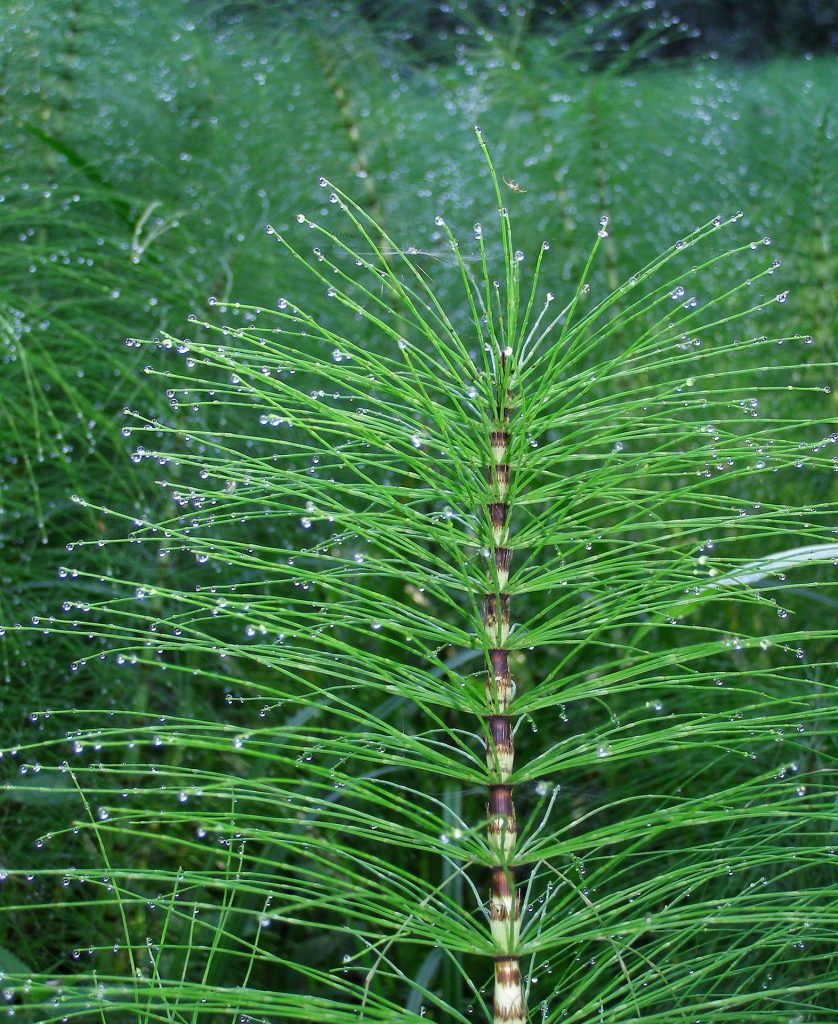 Horsetail (Equisetum arvense) is a strange and unique plant belonging to the Equisetaceae (horsetail) family of plants. Horsetail is native to the British Isles, parts of Europe and other temperate regions. Horsetail is often considered a garden weed. Horsetail grows in grasslands and meadows and can reach a height of about half a meter. Other common names for the plant include common horsetail or field horsetail. The plant grows in a brush-like formation with a central stem and multiple jointed protruding segments, and in this way resembles a bottle brush. Horsetail is used in traditional medicine and is a known effective antifungal agent. Horsetail is also interesting in that it is a non-photosynthetic plant that can accumulate silicon from the soil, and reproduces by means of a spore rather than a seed. The leaves, stem and flower of horsetail are rich in flavonoids, saponins, phenolic acids, volatile oils, triterpenoids, phytosterols, alkaloids and tannins, and these may explain the reported anxiolytic effects of the herb.
Horsetail (Equisetum arvense) is a strange and unique plant belonging to the Equisetaceae (horsetail) family of plants. Horsetail is native to the British Isles, parts of Europe and other temperate regions. Horsetail is often considered a garden weed. Horsetail grows in grasslands and meadows and can reach a height of about half a meter. Other common names for the plant include common horsetail or field horsetail. The plant grows in a brush-like formation with a central stem and multiple jointed protruding segments, and in this way resembles a bottle brush. Horsetail is used in traditional medicine and is a known effective antifungal agent. Horsetail is also interesting in that it is a non-photosynthetic plant that can accumulate silicon from the soil, and reproduces by means of a spore rather than a seed. The leaves, stem and flower of horsetail are rich in flavonoids, saponins, phenolic acids, volatile oils, triterpenoids, phytosterols, alkaloids and tannins, and these may explain the reported anxiolytic effects of the herb.

Horsetail (Equisetum arvense) contains a nutrient profile that may explain the anxiolytic and sedative properties of the herb. In particular the herb is rich in flavonoids, some of which have been shown to bind to the benzodiazepine receptor in the brain, eliciting a sedative and anxiolytic effect. The flavonoids present in horsetail include glycosides of the flavone apigenin and the flavone luteolin, as well as glycosides of the flavonol quercetin and the flavonol kaempferol. All four of these flavonoids have been shown to bind to the benzodiazepine receptor.
A number of animal studies have investigated the medicinal properties of common horsetail extracts. For example, in one study, researchers compared extracts of horsetail with the anxiolytic and sedative benzodiazepine drug diazepam. Both horsetail extracts and diazepam showed anxiolytic effects, although diazepam was superior in this respect. Common horsetail extracts are also able to potentiate the sleep inducing effects of ketamine, suggesting that the herb possesses sedative effects. Horsetail extracts have also been shown to induce cognitive improvements in rats, possibly through an antioxidant action. Common horsetail therefore possesses possible anxiolytic and sedative effects, and may also improve cognition. The chemical composition of the plant is very similar to other herbs with these effects, and so it is not a surprise that extracts of horsetail have medicinal properties. Horsetail is available as capsules, tinctures and capsules and could be useful to those with mild to moderate anxiety.

The volatile oils of horsetail (Equisetum arvense) have also been characterised. Over 25 constituents have been isolated from the oil including thymol. Thymol has been shown to elicit anxiolytic effects in animal models of anxiety. The thymol content of common horsetail may therefore contribute to the anxiolytic effects of the herb.
Eat Well, Stay Healthy, Protect Yourself
RdB
